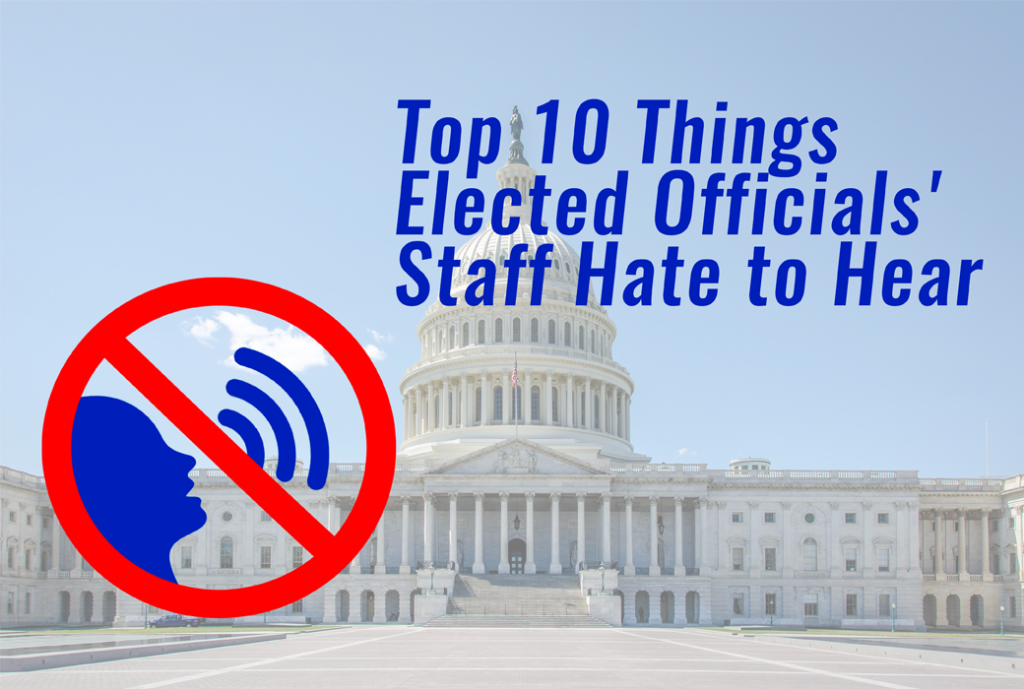
Top 10 Things Elected Officials’ Staff Hate to Hear
Number 10: But I thought my appointment was with the Senator.
Never, ever indicate that you are disappointed to be meeting with a staff person. On Capitol Hill, having a good relationship with staff can make or break your cause.
Number 9: Here’s some reading material for you – our 300-page annual report.
When meeting with a member of Congress or staff person, try to limit your leave behind materials to one or two pages, and include details on where this information can be located on the Web, if appropriate. Offering the information in a file folder with your organization’s name on the label will also help ensure that the materials are put in a file drawer, as opposed to the round file.
Number 8: How much of a campaign contribution did your boss get to vote against (or for) this bill?
Believe it or not, most staff have no idea who contributed to their boss’ campaigns. Not only is this question insulting, but even if it were accurate, the staff person isn’t likely to know.
Number 7: I assume you know all about HR 1234.
With thousands of bills being introduced during each Congress, no staff person will be able to keep them all straight. Always provide information on the bill title, number, and general provisions when communicating with a Congressional office.
Number 6: No, I don’t have an appointment, but I promise I’ll only take 30 minutes of your time.
If you weren’t able to get an appointment, it’s OK to stop by, drop off some materials and let them know of your interest in the issue. It is not OK to camp out in their doorway and demand that someone talk to you.
Number 5: No, I don’t really need anything specific.
If you don’t ask for something – a bill co-sponsorship, a congressional record statement, a meeting in the district, whatever – staff will wonder why you came by. Updates on your issue are fine, so long as they are accompanied by a request. That will ensure that someone in the office thinks about you and your request for longer than 5 minutes.
Number 4: We have 10 (or more) people in our group.
Congressional offices are tiny. If you have more than 5 people in your group, you’ll be standing out in the hallway. Plus, having so many people talking at once can dilute the impact of your message. Try to limit your group to no more than 5. If you do have a large group, assign a few people (specifically constituents) the responsibility of delivering the message.
Number 3: What you’re telling me can’t be right. I heard Stephen Colbert on the Late Show say otherwise.
Most staff, or Members for that matter, won’t lie to you. They know that lying will get them in big trouble. Sometimes, they may see things differently than you do, but if they say a bill definitely is not going to be considered on the floor, or if there is no such legislation, I’d believe them. A perfect example is a petition that was floating around the Internet about a House bill number 602P from a Congressman Schnell that would impose fees on use of e-mail. There is no such thing as either House bill 602P (that’s not even a possible number), nor is there a Congressman Schnell.
Number 2: What do you mean we have to stand in the hall?
See number 4. A request to meet in the hallway is simply an indication of space limitations. Nothing else.
Number 1: No, I don’t represent anyone from your district or committee interest. I just thought you’d be interested in what I have to say.
Members are elected to represent their constituents. Period. If you are not their constituent or you are not connected to their constituents, you are not relevant to them. Some members do rise to higher positions, but that just means they represent the interest of other members, not the entire nation. Your time is always best spent working with your own elected officials and turning them into advocates for your cause.


